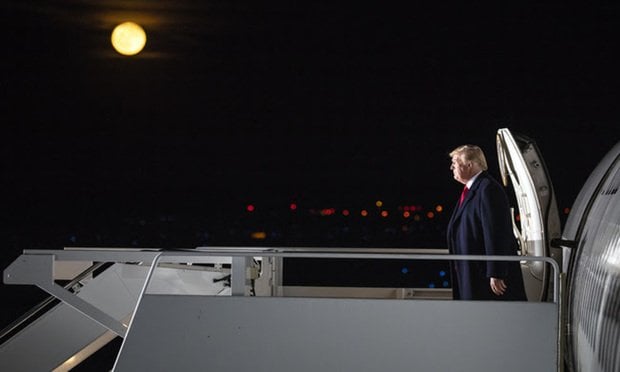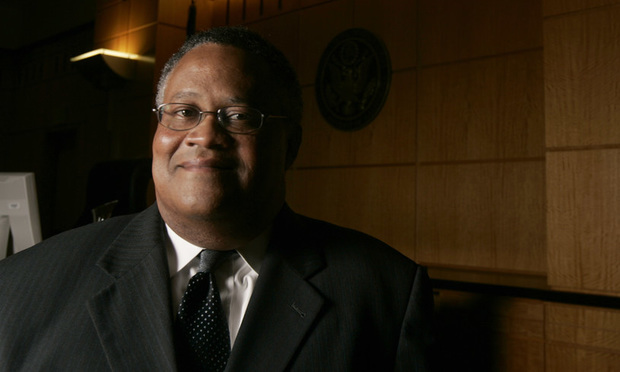California Defends New Law Requiring Candidates to Disclose Tax Returns
Separately, US District Judge Morrison England Jr. has set a Sept. 19 hearing in Sacramento to hear three related suits challenging the law.
August 14, 2019 at 07:26 PM
3 minute read
 Donald Trump. Courtesy photo: White House
Donald Trump. Courtesy photo: White House
California’s new law requiring presidential candidates to disclose their tax returns to qualify for the primary election does not conflict with state constitutional provisions that give the secretary of state authority to set the ballot, lawyers for the state said in a filing in the California Supreme Court on Wednesday.
Representing Secretary of State Alex Padilla, Deputy Attorney General Jay Russell said Article II of California’s Constitution gives the Legislature the power to “provide for” partisan presidential primary elections.
“The text of section 5(c) does not instruct, as petitioners contend, that all ‘recognized’ candidates must be on the ballot by virtue of the sole fact that they are ‘recognized,’ Russell wrote in the court filing. “Indeed, the text of article II, section 5(c) allows for a circumstance where a ‘recognized’ candidate is left off of the ballot, consistent with the neutral criteria that the Legislature” adopted with a bill this year requiring presidential and gubernatorial candidates to show their taxes, he said.
The California Republican Party and its chairwoman, Jessica Millan Patterson, filed suit last week to block enforcement of the tax-returns requirement. The measure, signed into law by Gov. Gavin Newsom on July 30, is aimed at forcing President Donald Trump to reveal five years of income tax documents, something he has refused to do since announcing his run for office in 2015.
 Judge Morrison England Jr. Photo: ALM
Judge Morrison England Jr. Photo: ALMThe state Supreme Court challenge is separate from three similar lawsuits that were recently consolidated in the U.S. District Court for the Eastern District of California. U.S. District Judge Morrison England Jr. of the Easter District of California, presiding over the three cases, has scheduled a Sept. 19 hearing to consider motions for a preliminary injunction.
Another suit challenging the state law is pending in federal court in California’s Southern District.
Russell and a team of lawyers for the state, including fellow deputy attorney general Chad Stegeman, argued in Wednesday’s filing that the Republican plaintiffs don’t have standing to sue.
“Both petitioners allege that without a writ of mandate, they will incur irreparable injury by the ‘likely absence of national-known candidates from the ballot,’” Russell wrote. “They further allege—without factual support—that the law’s purpose ‘may have been to suppress’ voting for Republican candidates, both for president and for ‘down ballot’ offices.”
Those harms are speculative, the California state lawyers said. “If most or all potentially recognizable candidates comply with the law, petitioners’ feared harm will not occur,” they argued.
The state’s lawyers also contend the California Supreme Court may not be the proper venue for the case. The Legislature has made Sacramento County Superior Court the “exclusive” venue for ballot challenges naming the secretary of state, Russell wrote.
Even if the high court decides that it has proper jurisdiction over the case, the state’s brief said, there is no need to issue for justices to issue an immediate stay. Candidates have until Nov. 26, 2019 to comply with the disclosure law, according to the secretary of state.
The California Republican Party and Patterson have until Friday to respond to the state’s filing. The state Republicans are represented by the Sacramento law firm of Bell, McAndrews & Hiltachk.
This content has been archived. It is available through our partners, LexisNexis® and Bloomberg Law.
To view this content, please continue to their sites.
Not a Lexis Subscriber?
Subscribe Now
Not a Bloomberg Law Subscriber?
Subscribe Now
NOT FOR REPRINT
© 2025 ALM Global, LLC, All Rights Reserved. Request academic re-use from www.copyright.com. All other uses, submit a request to [email protected]. For more information visit Asset & Logo Licensing.
You Might Like
View All
Invoking Trump, AG Bonta Reminds Lawyers of Duties to Noncitizens in Plea Dealing
4 minute read

California's Chief Justice Starts Third Year With Questions About Fires, Trump and AI
4 minute read
Willkie Farr & Gallagher Drives Legal Challenge for Uber Against State's Rideshare Laws
5 minute readTrending Stories
Who Got The Work
J. Brugh Lower of Gibbons has entered an appearance for industrial equipment supplier Devco Corporation in a pending trademark infringement lawsuit. The suit, accusing the defendant of selling knock-off Graco products, was filed Dec. 18 in New Jersey District Court by Rivkin Radler on behalf of Graco Inc. and Graco Minnesota. The case, assigned to U.S. District Judge Zahid N. Quraishi, is 3:24-cv-11294, Graco Inc. et al v. Devco Corporation.
Who Got The Work
Rebecca Maller-Stein and Kent A. Yalowitz of Arnold & Porter Kaye Scholer have entered their appearances for Hanaco Venture Capital and its executives, Lior Prosor and David Frankel, in a pending securities lawsuit. The action, filed on Dec. 24 in New York Southern District Court by Zell, Aron & Co. on behalf of Goldeneye Advisors, accuses the defendants of negligently and fraudulently managing the plaintiff's $1 million investment. The case, assigned to U.S. District Judge Vernon S. Broderick, is 1:24-cv-09918, Goldeneye Advisors, LLC v. Hanaco Venture Capital, Ltd. et al.
Who Got The Work
Attorneys from A&O Shearman has stepped in as defense counsel for Toronto-Dominion Bank and other defendants in a pending securities class action. The suit, filed Dec. 11 in New York Southern District Court by Bleichmar Fonti & Auld, accuses the defendants of concealing the bank's 'pervasive' deficiencies in regards to its compliance with the Bank Secrecy Act and the quality of its anti-money laundering controls. The case, assigned to U.S. District Judge Arun Subramanian, is 1:24-cv-09445, Gonzalez v. The Toronto-Dominion Bank et al.
Who Got The Work
Crown Castle International, a Pennsylvania company providing shared communications infrastructure, has turned to Luke D. Wolf of Gordon Rees Scully Mansukhani to fend off a pending breach-of-contract lawsuit. The court action, filed Nov. 25 in Michigan Eastern District Court by Hooper Hathaway PC on behalf of The Town Residences LLC, accuses Crown Castle of failing to transfer approximately $30,000 in utility payments from T-Mobile in breach of a roof-top lease and assignment agreement. The case, assigned to U.S. District Judge Susan K. Declercq, is 2:24-cv-13131, The Town Residences LLC v. T-Mobile US, Inc. et al.
Who Got The Work
Wilfred P. Coronato and Daniel M. Schwartz of McCarter & English have stepped in as defense counsel to Electrolux Home Products Inc. in a pending product liability lawsuit. The court action, filed Nov. 26 in New York Eastern District Court by Poulos Lopiccolo PC and Nagel Rice LLP on behalf of David Stern, alleges that the defendant's refrigerators’ drawers and shelving repeatedly break and fall apart within months after purchase. The case, assigned to U.S. District Judge Joan M. Azrack, is 2:24-cv-08204, Stern v. Electrolux Home Products, Inc.
Featured Firms
Law Offices of Gary Martin Hays & Associates, P.C.
(470) 294-1674
Law Offices of Mark E. Salomone
(857) 444-6468
Smith & Hassler
(713) 739-1250






